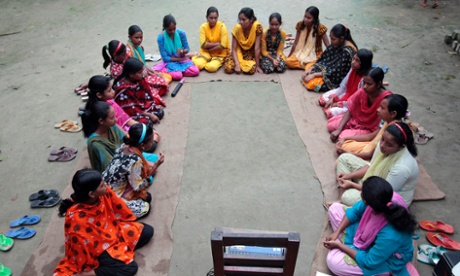Source: The Guardian
But report warns population growth could outpace family planning programmes in some countries despite range of contraception initiatives
The number of women and girls accessing contraceptives in developing countries rose by 8.4 million last year, but efforts to bring family planning to millions of women who have not been reached are not moving fast enough, according to a report published on Monday.
The Family Planning 2020 (FP2020) report, the group's first set of annual data since its formation two years ago, found that the number of women and girls with access to contraceptives was still below FP2020's projected benchmark of 9.4 million. However, widening access to family planning services helped avert 125,000 maternal deaths last year, compared with 120,000 in 2012, and avert 24m unsafe abortions, compared with 23m in the previous year.
The FP2020 partnership was created as a result of the London family planning summit, where donors pledged $2.6bn (£1.2bn) to bring contraception to 120 million more women and girls in developing countries by 2020.
The report, Partnership in Progress, assessed how the funding boost had influenced women's reproductive health standards in the world's poorest countries.
"We anticipated that growth would be slowest in the first years of the initiative as countries and partners expand their programmes. In many countries, an enormous effort is required simply to maintain existing levels of service," the report said. "The data show that FP2020 is on the right track and making steady progress; however, we must collectively accelerate our efforts in order to reach 120 million more women and girls by 2020."
The increase in access to contraceptives is keeping up with population increases in some countries, including Bhutan, Djibouti, Kenya and Rwanda, where contraceptive growth rates exceeded 2.5% last year compared with an average of 0.65% in developing countries.
But the report warned that population growth threatened to outpace the expansion of family planning programmes in some countries. It noted that while the world has made progress on the millennium development goal to reduce maternal mortality, the target to provide universal access to reproductive health is far from being achieved.
The UN population fund estimates that the "unmet need" of voluntary family planning will grow by 40% in the next 15 years.
FP2020 outlined key projects that improved family planning access for women in the past year, including the global contraceptive implant programme. The project addressed the barriers that blocked women from accessing implants, such as high costs, a lack of training for healthcare workers and supply shortages. As a result of agreements with pharmaceutical companies, the project has halved the cost of implants in more than 60 countries. FP2020 said this reduction has had a significant impact, with uptake of implants in developing countries tripling from 2.4m units in 2011 to a projected 7.7m units this year.

Another highlight was the rollout of a new form of injectable contraceptive in Burkina Faso, Niger, Senegal and Uganda. The contraceptive, Sayana Press, uses a disposable syringe that is easier to administer, which means community health workers can deliver it to patients after only two hours' training. In Burkina Faso, 250,000 units of Sayana Press will be distributed this year.
In Senegal, health authorities have implemented a new system to solve the problem of clinics running out of contraceptives. FP2020 director Beth Schlachter said the "informed push" system had been inspired by the retail industry. "Instead of clinics and pharmacies having to call in orders for contraceptives, a driver with a truckful of supplies stops by regularly to top up the stock. It's the same kind of system used in the commercial sector for vending machines, and it works just as well for contraceptive commodities," she said.
In Kenya, health clinics are using text messages to combat empty shelves. As part of one project, nurses send inventory reports via text to a central data management centre and the contraceptives are sent out immediately. Other innovations included the mCenas! project in Mozambique, which educates young people about contraception via text, and a television and online series in India that highlights family planning through drama programmes.
Five more countries – Benin, the Democratic Republic of the Congo, Guinea, Mauritania and Burma – last year pledged to expand access to contraception, bringing the tally of committed countries to 29. Schlacter said it was promising to see 12 countries host conferences on family planning in the past year.
"Countries that have never before endorsed family planning – such as Myanmar [Burma] and Uganda – are now holding national conferences on the subject. Ministries of health are developing costed implementation plans and adding contraceptive line items to their budgets," she said. "This is what progress looks like. We still have long road to 2020, but together, we'll get there."

